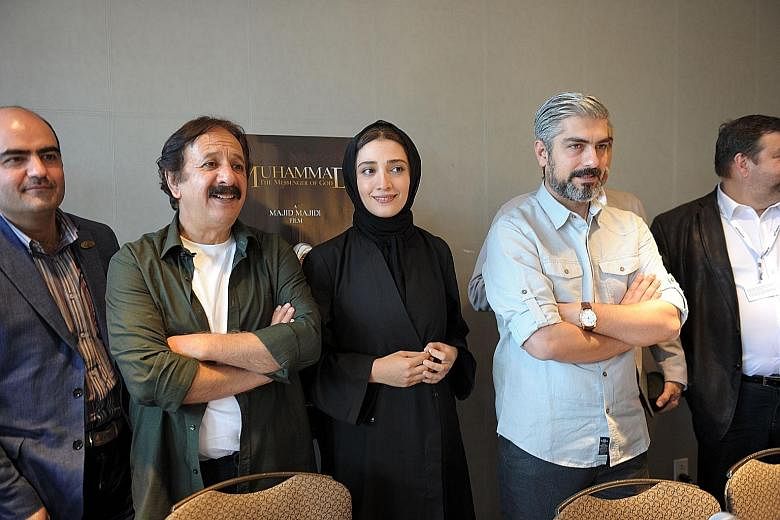DUBAI • A film on the life of Prophet Mohammad is expected to break box office records in Shi'ite Muslim Iran, but some Sunni Muslim clerics in the Arab world are demanding that Teheran ban it.
The state-sponsored Mohammad, Messenger Of God, directed by Oscar-nominated director Majid Majidi, is, at US$40 million (S$56 million), Iran's most expensive movie to date. It started showing in Iran last Thursday.
"I decided to make this film to fight against the new wave of Islamophobia in the West. The Western interpretation of Islam is full of violence and terrorism," Mr Majidi was quoted as saying by Hezbollah Line, a conservative Iranian magazine.
The 171-minute movie, the first part of a planned trilogy, focuses on the Prophet's childhood. His face will not be shown on screen, in accordance with Islamic strictures. The camera shows the boy actor playing him only from behind, or only his shadow. A steadicam was customised especially to depict Mohammad's point of view by the Oscar-winning Italian cinematographer Vittorio Storaro. The identity of the boy playing Mohammad has not been made public.
Egypt's Al-Azhar, the most prestigious institute of Sunni Islam, is not satisfied with such precautions and has called on Iran to ban the film. "This matter is already settled. Syariah (Islamic law) prohibits embodying the prophets," said Professor Abdel Fattah Alawari, dean of the Islamic theology faculty at Al-Azhar. "It is not permissible in Islam that someone (an actor) has contradictory and conflicting roles; sometimes we see him as a blind drunk, sometimes as a womaniser... and then he embodies a prophet... this is not permissible."
Regional rivalry between Sunni power Saudi Arabia and Shi'ite Iran has intensified mutual suspicion between followers of the two branches of Islam in recent decades. There has been no official comment on the movie yet from Saudi Arabia, where Islam was born more than 1,400 years ago.
"Most of these reactions are political," Mr Sami Yusuf, who is one of the Islamic world's biggest musical stars and who sang the soundtrack for the film, told Reuters.
"I am sure people in Al-Azhar and others who criticise the film haven't seen it yet. They are against the film only because it's a cultural export of Iran."
He said it was a "shame" there were only two major productions describing the life of Mohammad, in contrast to the many on Jesus Christ and other prophets.
Iran's Supreme Leader, Ayatollah Ali Khamenei, has visited the film set, in a strong sign of support.
Depictions of Mohammad have often provoked angry unrest after being deemed blasphemous by Muslims. Cartoons published by a Danish newspaper in 2005 were followed by violent protests in which scores of people died, attacks on embassies and consumer boycotts. Islamist militants shot dead 12 people at the offices of French magazine Charlie Hebdo in January this year, saying they were avenging its blasphemous cartoon depictions of Mohammad.
Iran's late Supreme Leader Ayatollah Khomeini issued a fatwa calling on Muslims to kill writer Salman Rushdie in 1988 for The Satanic Verses, a novel deemed blasphemous in its treatment of Mohammad and Islam.
Mohammad, Messenger of God, is being released in 143 cinemas in Iran on the same day as it opens at the Montreal Film Festival.
REUTERS

